Part 2 of a 4 part article titled Geroscience… written by Felipe Sierra the US head of research in aging biology…
Part 2 of the 4-part essay” Geroscience” by Felipe Sierra. This segment explores the main pillars of aging biology research.



Free radicals are costly.
Summary: Here’s what researchers have discovered about stopping the destruction caused by free radicals, including DNA damage, macromolecular damage, and damage to mitochondrial DNA. [This article first appeared on the website LongevityFacts.com. Author: Brady Hartman. ]
Scientists widely believe that DNA damage and macromolecular damage caused by free radicals generated by our mitochondria is the principle cause of aging.
However, they may have found a way to stop it.

Summary: A brief review of the top reports in 2017 on prediabetes and type 2 diabetes treatments, including new ones and those in the pipeline. [This article first appeared on the LongevityFacts.com website. Author: Brady Hartman.]
A paper published in the Lancet shocked the public last year when they reported that 40% of Americans walking around today would develop type 2 diabetes. While type 2 diabetes is a leading cause of premature death, the World Health Organization (WHO) upset even more people when they announced that prediabetes – the precursor state to diabetes – kills far more people.
Here’s a look back at the reports in 2017 on the ways to prevent type 2 diabetes and prediabetes and the promising treatments in the pipeline for these two forms of diabetes.

Scientists are searching for an effective Parkinsons treatment.
Summary: A disease-modifying drug for Parkinson’s disease remains the goal of researchers as they develop promising treatments using gene therapy, autophagy upregulators, and brain mapping. [Author: Brady Hartman. This article first appeared on LongevityFacts.]
Parkinson’s, Alzheimer’s and other forms of dementia are diseases of aging, and the incidence of these conditions rise with each passing year. Doctors expect these disorders to ramp up with increasing life expectancies.
Researchers aren’t just focusing on treatments for Alzheimer’s disease. Fortunately, scientists throughout the world are developing promising treatments for Parkinson’s disease as well.


8 top videos of the future of medicine from 2017.
Summary: a review of the eight top videos on the future of medicine reported in 2017. [This article first appeared on the LongevityFacts.com website. Author: Brady Hartman.]
Throughout 2017, a new breed of researchers called geroscientists were working on revolutionary medical advances, including cancer-seeking bacteriobots, lab-grown organs, soft robots that help an ailing heart to beat, weaponized killer T-cells, plans for radical life extension, advancements in CRISPR gene editing, and the emergence of the microbiome in human health.
These videos came from many sources including Kurzsegat, Popular Science, and the journal Nature. Here’s a look back at the 8 videos in 2017 that shows us the coming revolutionary advances in healthcare.

A tissue-based soft robot that mimics the biomechanics of a stingray has been developed, which could lead to advances in bio-inspired robotics, regenerative medicine and medical diagnostics.
The simple body design of stingrays, specifically, a flattened body shape and side fins that start at the head and end at the base of their tail, makes them ideal to model bio-electromechanical systems on.
The 10-millimeter long robot is made up of four layers: tissue composed of live heart cells, two distinct types of specialized biomaterials for structural support, and flexible electrodes. Imitating nature, the robotic stingray is even able to “flap” its fins when the electrodes contract the heart cells on the biomaterial scaffold.

The famed startup incubator Y Combinator put out a call for companies that want to increase human longevity and “health span.”
Who they want: Founders with new ideas for treating old-age diseases like Alzheimer’s, “but we will also consider more radical anti-aging schemes,” YC president Sam Altman told MIT Technology Review.
Why longevity? Efforts to stop old age don’t actually get funded much. “My sense is that economic incentives of drugs companies are screwed up” says Altman. “I don’t think we have enough people saying, How can we make a lot of people a lot heathier?”

After losing her faith, a former evangelical Christian felt adrift in the world. She then found solace in a radical technological philosophy – but its promises of immortality and spiritual transcendence soon seemed unsettlingly familiar by Meghan O’Gieblyn.